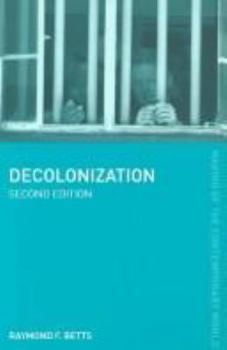Decolonization
Select Format
Select Condition 
Book Overview
Raymond F. Betts considers the 'process' of decolonization and the outcomes which have left a legacy of problems, drawing on numerous examples including Ghana, India, Rwanda and Hong Kong. He examines:
Format:Paperback
Language:English
ISBN:0415318211
ISBN13:9780415318211
Release Date:February 2004
Publisher:Routledge
Length:144 Pages
Weight:0.41 lbs.
Dimensions:0.5" x 5.7" x 8.5"
Customer Reviews
2 ratings
De-possessioning foreign colonialists and the making of domestic colonialists?
Published by Thriftbooks.com User , 15 years ago
I highly recommend this thought-provoking little book - "Decolonization." Many have written brilliant accounts of decolonization, however most such writings are either aimed at specialized readers or they are just too long for layreaders. This one is a rare exception. In barely a hundred pages Raymond Betts describes the forces that undermined colonialism, what decolonization meant for the urban as opposed to the rural populations, and the problems that accompanied, or perhaps even created by, the independences of many former colonies. Scholars of an activitist orientation such as Walter Rodney would blame it all on colonists. However, after these many years is the blame still valid? Some would say "yes" and point to ethnolinguistic fractionalization and the fact that in most cases decolonization left colonial boundaries unchanged. Others are not so sure because by abolishing colonial laws that prevented internal migration from rural to urban areas, independence has essentially created urban squality observed in many former colonies today. Betts concludes that rather than being monolithic, "decolonization is most easily appreciated and measured as a series of political acts, occasionally peaceful, often confrontational, and frequentlly militant, by which territories and countries dominated by Europeans gained their independence" (p .98. The success of the "colonies, like fruit, would fall from the tree when ripe" - here Betts is paraphrazing the French Philosopher Turgot. Intellectually stimulating, for sure. Amavilah, Author Modeling Determinants of Income in Embedded Economies ISBN: 1600210465 ISBN: 1600210465 Quotable Arthur Schopenhauer ISBN: 9781430324959
Good show.
Published by Thriftbooks.com User , 23 years ago
The author of this book is clearly literate and well-read, and puts together a really interesting chronology and analysis of the effects of the breakup of the European empires. At the beginning I wasn't very encouraged, as I found the first chapter to be a little too abstract and opining, but thereafter the author quickly gets into some fascinating matters of real substance. We learn where the term 'third world' was first used; how when the inhabitants of French Guinea opted for full independence the French decolonised so emphatically they took the phones off the walls when they left; how Bokassa's coronation ceremony is alleged to have cost a quarter of his country's wealth, and so on.Don't let the brevity put you off: this is a well-written, well-rounded portrait of decolonisation by a guy with informed opinions on these matters. A great read.






